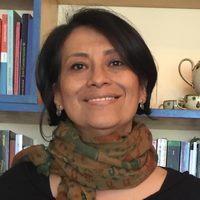Elizabeth Jimenez Zamora
FIELDS OF EXPERTISE:
Development Economics and Rural Development
Ph.D. in Development Economics (2000) University of Notre Dame, Notre Dame, IN (USA)
M.A. in Development and International Economics (1995) University of Notre Dame, Notre
Dame, IN (USA)
B.A. (Licenciatura) in Economics (1990) Universidad Tomás Frías. Potosí, Bolivia.
Ph.D Thesis: “Segmented labor markets and migrant workers: A case study of rural migrant
workers in Bolivia”
ACADEMIC AWARDS:
1999 The Jerome Levy Economics Institute. Fellowship to participate in the
summer courses of the “School in Institutional Economics.”
1997 University of Michigan Center for Latin American Studies. Fellowship to
participate in the “Training Program in Quantitative Methods for Social
Research.”
1993 University of Notre Dame Zahm Research Grant. To conduct field research in
Bolivia.
1991 Kellogg Institute for International Studies Research Grant. To conduct field
research in Bolivia
1988-1992 Fulbright Scholarship. To pursue graduate studies in the United States.
Recent experiences in research coordination:
2014 Present Researcher and Research-Coordinator in Bolivia of the research project:
FATE Feminisation, Agricultural Transition, and Rural Employment. Part of
R4D (Research for Development) funded by the SNSF (Swiss National
Science Foundation) in coordination with CDE (Centre for Development and
the Environment) of the University of Bern, Switzerland.
2014 2015 Research Sub-Director CIDES UMSA, The Graduate Program in Social
Sciences Universidad Mayor de San Andres) La Paz, Bolivia.
2010-2013 Research coordinator South American regional office JACS-SAM NCCR
North South (National Centre of Competence in Research funded by the
SNSF (Swiss National Science Foundation) and SDC (Swiss Agency for
Development and Cooperation).
2006-2010 Co-Investigator and research-coordinator in Bolivia of the project “Adapting
to change in Vulnerable Ecosystems in the Andes” sponsored by SANREM
CRSP (Sustainable Agriculture and Natural Resource Management
Collaborative Research Support Program) funded by the NSF in with
coordination with the Department of Applied Economics of the University of
Missouri, USA.
Teaching:
2008-present Full-time Professor and Coordinator of the Master’s Program on
Development Economics and. CIDES – UMSA, Graduate Program in Social
Sciences, Universidad Mayor de San Andres La Paz, Bolivia. Classes are
given in the MA and Ph.D programs on the following subjects: Theories of
Economic Development, Institutional Economics, Rural Development and
Management of Natural Resources
2001-2008 Invited Professor at various Bolivian Universities including: Universidad
Privada del Valle (La Paz, Bolivia), Universidad Andina Simón Bolivar and
Universidad Mayor de San Simón (La Paz, Bolivia), Universidad Mayor de
San Simón (Cochabamba, Bolivia).
1999 –2000 Full-time Professor: The Queen's University of Belfast, Department of
Economics (Belfast, United Kingdom).
1998 to 1999 Lecturer: University of Wisconsin in Milwaukee
Academic membership:
ABCE Member of the Bolivian Academy of Economic Sciences (Academia Boliviana de
Ciencias Económicas)
Member of the Scientific Research Council (SRL) of the Mountain Research Initiative (MRI).
http://www.mountainresearchinitiative.org/en/the-mri/team/principal-investigators
Member of the Academic Review Panel of R4D (Research for Development). To review and
assess research proposals for funding by the SNSF (Swiss National Science Foundation)
LASA (Latin American Studies Association)
AAG (American Association of Geography)
Globalization, agricultural transformations and the role of exports:
A comparative analysis of livelihoods strategies among small-scale farmers in Bolivia, Laos, Nepal and Rwanda
(Draft Only)
Elizabeth Jiménez(CIDES, UMSA), Eliud Abucheli (CIAT, Ruanda), Saithong Pommavong (Universidad Nacional de Laos) and Bishnu Upreti (NCCR, Nepal), Sabin Biere (CDE, Berna)
The main objective of this paper is to highlight differentiation and inequalities in the process of integration of small-scale agricultural farmers into globalized markets. Thus, the analysis would aim at showing that not everybody gains or losses from entering highly uncertain and volatile crop markets. Higher economic gains (measured by family income levels) are also not necessarily associated with long-run sustainable strategies and with an overall sustainable use of natural resources such as land. Comparing different experiences across significantly different geographic contexts (i.e., Bolivia, Nepal, Laos and Ruanda) also provides insights to explain differentiation and inequalities embedded in the process of integration to globalized markets
RECENT PUBLICATIONS:
- ¿Puede el Litio energizar el desarrollo productivo en Bolivia? Coordinadora CIDES UMSA. La Paz, Bolivia. Forthcoming 2018.
- El sector gremial en Bolivia: Características, evolución y actores CIS (Centro de Investigaciones Sociales ) La Paz, Bolivia. Forthcoming 2018
- ¿Que sabemos sobre ingresos rurales en Bolivia? en Revista UMBRALES No 27/28 CIDES, UMSA. La Paz, Bolivia. 2016 pp: 183-204
- “De la tragedia de los comunes y la maldición de los recursos: La economía de los “recursos naturales” en Discusiones sobre Lo Publico G. Rojas Ortuste. CIDES UMSA. La Paz, Bolivia 2015
- “Empleo y oportunidades económicas en la ciudad de El Alto, Bolivia” Mundos de trabajo en transformación: entre lo local y lo global R. Barragan y P Uriona Coordinadoras. CIDES-UMSA, 2014.
- “Can Lithium Energize Sustainable Development in Bolivia? Institutional and Policy Challenges,” inJournal of Environmental Science and Engineering. Volume 2. Number 9 September 2013 B2 ISSN 1934-8932
- Cambio Climático y Adaptación en el Altiplano Boliviano Coordinadora. CIDES-UMSA La Paz, Bolivia. 2013.
- “Instituciones, organizaciones y el manejo de los comunes en Bolivia: Un análisis de la Ley de Revolución Comunitaria Agropecuaria. En Revista Umbrales. CIDES-UMSA. La Paz, Bolivia. 2012.
- La Economía del Cuidado en Bolivia, Parte I. REMTE Red de Mujeres Tranformando la Economía. La Paz, Bolivia 2011.
- La Economía del Cuidado en Poblaciones del Altiplano de La Paz, Parte II. REMTE Red de Mujeres Tranformando la Economía. La Paz, Bolivia 2011.
- "Adapting to Climate Change in Andean Ecosystems: Landscapes, Capitals, and Perceptions shaping Rural Livelihood Strategies and Linking Knowledge Systems" Co-authors C. Valdivia, J. Gilles, J. Cusicanqui and Magaly Annals of the Association of American Geographers. Special Issue on Climate Change 2010.
- “La diversificación de los ingresos rurales en Bolivia” en Iconos. Revista de Ciencias Sociales. Num. 29, Quito, Septiembre 2007, pp. 63-76 © Facultad Latinoamericana de Ciencias Sociales-Sede Académica de Ecuador. ISSN: 1390-12.

